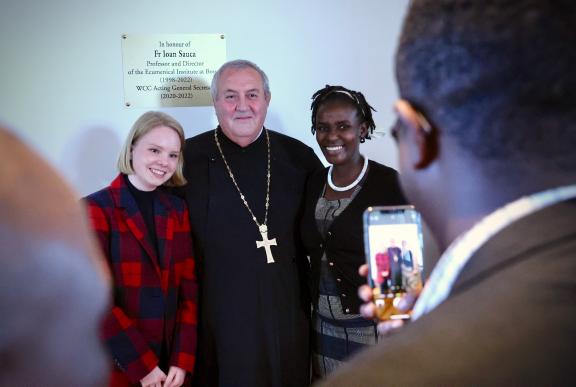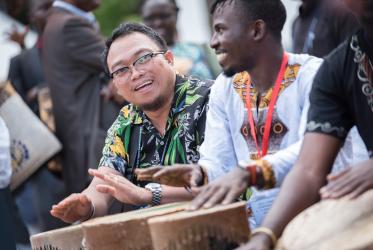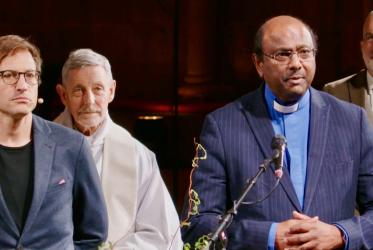A meeting room at Bossey was named in honour of Sauca at the end of the institute’s Dies Academicus (Academic Day) on 1 November, at which faculty and students gathered for a day organized around the theme “Ecumenical Formation at Bossey: Perspectives for the Future.”
At the ceremony, Bossey’s academic dean, the Rev. Prof. Dr Simone Sinn, paid tribute to Sauca’s commitment to the Ecumenical institute. Greetings were also brought by Bishop Heike Springhart of the Protestant Church in Baden, Germany, where the WCC recently held its 11th Assembly.
The Ecumenical Institute organizes in collaboration with the University of Geneva an annual residential course on ecumenical studies for graduate students of theology from many different Christian traditions.
Sauca was named the WCC’s acting general secretary since April 2020. A priest from the Romanian Orthodox Church, he joined the staff of the WCC in 1994 with responsibility for Orthodox Studies and Relationships in Mission before becoming professor of missiology and ecumenical theology at Bossey in 1998. He will take his retirement at the end of 2022.

Rev. Prof. Dr Ioan Sauca taking a photo with Bossey students in a meeting room of the Ecumenical Institute named in honour of him during theinstitute’s Academic Day.
Also honoured at the Dies Academicus was the WCC’s acting deputy general secretary and director of its Faith and Order Commission, the Rev. Dr Odair Pedroso Mateus from the Independent Presbyterian Church of Brazil, who like Sauca will retire at the end of the year.
Mateus has been a faculty member at Bossey since 2004 as professor for ecumenical theology.
At the Dies Academicus Sauca and Mateus were joined at a panel discussion on ecumenical formation by the dean of the University of Geneva’s faculty of theology, Prof. Dr Elisabeth Gangloff-Parmentier.
Introducing the panel, the WCC’s programme director for Unity, Mission and Ecumenical Formation, the Rev. Kuzipa Nalwamba, noted that both Sauca and Mateus had been graduate students at Bossey: Sauca from 1984 to 1985, and Mateus from 1981 to 1982.
In his contribution, Sauca underlined the need for ecumenical formation as the foundation for a new ecumenical paradigm that seeks the unity that God intends for the world.
“I hope that Bossey continues to be that laboratory of the ecumenical movement to prepare people who will not give up their Christ affirmation, but who are ready to look with the eyes of Christ who did not come only for Christians, but who came for the whole world,” he said.
This is the direction, said Sauca, given by the WCC’s 11th Assembly, which called for churches to engage in a pilgrimage of justice, reconciliation, and unity.

Rev. Dr Odair Pedroso Mateus, WCC’s acting deputy general secretary and director of its Faith and Order Commission addressing the Bossey students during the institute’s Academic Day on 1 November.
Mateus noted how the Ecumenical Institute had been created in 1946, two years before the WCC’s official foundation, to promote church renewal after the Second World War, where churches sometimes had greater allegiance to national identities than a sense of the catholicity of the church-
“Bossey,” said Mateus, “is a place where the multicultural and the multiconfessional come together in common life, common prayer, and common study.”
Speaking from her experiences in a university faculty of theology, Gangloff-Parmentier highlighted three tasks for ecumenical theological education: the need to exercise mutual accountability; to promote reconciliation and peace with justice; and to promote bonds together for the future.
“Ecumenism can only be a transformative movement driven by a committed theology,” she said.
“Bossey is really a wonderful laboratory,” she said. “Living side by side helps to learn patience, endurance and to fully live the possibilities of dialogue. It's a chance to recognize that the other church is also in a true quest of faith, a true quest of the gospel.”
Following the panel, students explored in groups issues of ecumenical learning as a prophetic message to the contemporary situation, a space for negotiating ecumenical controversies, a place for conflict transformation, and as intercultural-theological practice.
Academic dean Simone Sinn described the Dies Academicus as a day of gratitude for the work of Sauca and Mateus.
“We can look to the future because we stand on firm ground,” she said. “And standing on that firm ground, we can creatively discuss, critically discuss, what the perspectives for the future of ecumenical formation will be.”
Photo gallery of the Dies Academicus at the Ecumenical institute in Bossey







